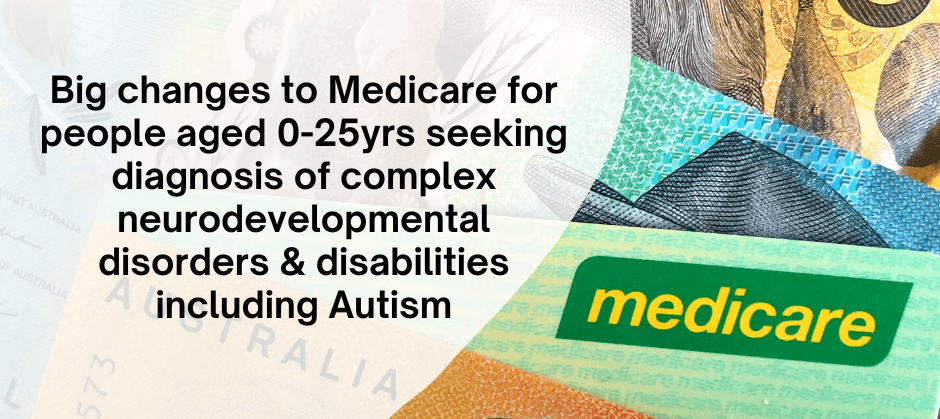
Medicare changes to Autism Diagnosis
There was an important change to Medicare on the 1st March 2023 that you need to know about, and share with your networks. A Medicare rebate is now available for diagnostic assessment of complex neurodevelopmental disorders and eligible disabilities prior to 25th Birthday (0-25yrs).
As of the 1st March 2023, GPs can now write a referral to private diagnosticians for a range of eligible disabilities, with a Medicare rebate applicable. Autism has been classified as a Complex Neurodevelopmental Disorder, and requires a referral from a paediatrician or psychiatrist for the Medicare rebate to apply.
Previously diagnostic reports from a paediatrician, registered or clinical psychologist and speech pathologist were required for an autism diagnosis to be formalised in WA for kids aged 0-12yrs.
For kids aged 0-12yrs, autism diagnostic assessment will need to be performed by:
- Psychologist and Paediatrician / Paediatric Psychiatrist OR
- Psychologist and Speech Pathologist OR
- Psychologist and Paediatrician / Paediatric Psychiatrist and Speech Pathologist
Most schools can now apply for support funding with a diagnosis from only 2 out of 3 possible diagnosticians, bringing WA into line with the rest of Australia (as per the National Guidelines for Autism Diagnosis). Note that public schools can apply for more support funding than private schools.
For kids aged 13-17yrs, autism diagnostic assessment will need to be performed by:
- Registered / Clinical Psychologist and Paediatrician / Paediatric Psychiatrist OR
- Clinical Psychologist (in some cases) OR
- Paediatric Psychiatrist (in some cases)
Please note that for people needing to access the public diagnostic pathway through Department of Communities – Disability Services for autism diagnostic assessment (0-17yrs), a Paediatrician referral is still required.
For adults aged 18yrs and over, autism diagnostic assessment would need to performed by:
- Registered / Clinical Psychologist and Psychiatrist OR
- Clinical Psychologist (in some cases) OR
- Psychiatrist (in some cases)
The Medicare rebate is now available for people aged 0-25yrs, and as stated above, GPs are able to provide the referral for eligible disabilities in the list below. You can find out more about the changes at:
Diagnostic assessments for the following eligible disabilities are covered by the change:
- sight loss resulting in vision of less than or equal to 6/18 vision or equivalent field loss in the better eye, with correction
- hearing loss with either
- a hearing loss of 40 decibels or greater in the better ear, across 4 frequencies
- permanent conductive hearing loss and auditory neuropathy
- deafblindness
- cerebral palsy
- Down syndrome
- Fragile X syndrome
- Prader-Willi syndrome
- Williams syndrome
- Angelman syndrome
- Kabuki syndrome
- Smith-Magenis syndrome
- CHARGE syndrome
- Cri du Chat syndrome
- Cornelia de Lange syndrome
- Microcephaly, if a child has
- a head circumference less than the third percentile for age and sex
- a functional level at or below 2 standard deviations below the mean for age on a standard development test or an IQ score of less than 70 on a standardised test of intelligence
- Rett’s disorder
- Foetal Alcohol Spectrum Disorder (FASD)
- Lesch-Nyhan Syndrome
- 22q deletion syndrome.
This is a very significant and important change for desperate families trying to access diagnosis and support for their children. There are currently huge waitlists for paediatricians in WA, with many having closed their waitlists completely.
Please contact us if you would like more information about this change, and what it means for you / your family member.

